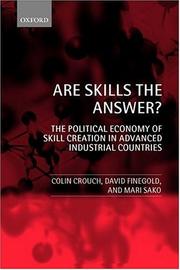| Listing 1 - 3 of 3 |
Sort by
|

ISBN: 0226239632 9786611430887 1281430889 0226239640 9780226239644 9780226239637 9780226239637 Year: 2000 Publisher: Chicago : University of Chicago Press,
Abstract | Keywords | Export | Availability | Bookmark
 Loading...
Loading...Choose an application
- Reference Manager
- EndNote
- RefWorks (Direct export to RefWorks)
Since the early 1980's, the U.S. economy has experienced a growing wage differential: high-skilled workers have claimed an increasing share of available income, while low-skilled workers have seen an absolute decline in real wages. How and why this disparity has arisen is a matter of ongoing debate among policymakers and economists. Two competing theories have emerged to explain this phenomenon, one focusing on international trade and labor market globalization as the driving force behind the devaluation of low-skill jobs, and the other focusing on the role of technological change as a catalyst for the escalation of high-skill wages. This collection brings together innovative new ideas and data sources in order to provide more satisfying alternatives to the trade versus technology debate and to assess directly the specific impact of international trade on U.S. wages. This timely volume offers a thorough appraisal of the wage distribution predicament, examining the continued effects of technology and globalization on the labor market.
US / United States of America - USA - Verenigde Staten - Etats Unis --- 382.51 --- 332.27 --- 338.043 --- 332.70 --- Aard, belang en evolutie. Handelsbalans. J curve. --- Loonpolitiek. --- Technologische vooruitgang. Automatisering. Computers. Werkgelegenheid en informatica. --- Geschoolde en ongeschoolde arbeid: algemeen. --- Foreign trade and employment --- International trade --- Wages --- Compensation --- Departmental salaries --- Earnings --- Pay --- Remuneration --- Salaries --- Wage-fund --- Wage rates --- Working class --- Income --- Labor costs --- Compensation management --- Cost and standard of living --- Prices --- Employment and foreign trade --- Labor market --- Commerce --- Labor supply --- Investments, Foreign, and employment --- Trade adjustment assistance --- Effect of international trade on --- Trade theory --- E-books --- Loonpolitiek --- Geschoolde en ongeschoolde arbeid: algemeen --- Technologische vooruitgang. Automatisering. Computers. Werkgelegenheid en informatica --- Aard, belang en evolutie. Handelsbalans. J curve --- Foreign trade and employment - United States --- Wages - United States --- trade, wages, economics, finance, business, international, investment, wage differential, skills, labor, employment, income, globalization, technology, engineering, foreign, education, inequality, offshore assembly, production, manufacturing, competition, exchange rates, nonfiction, product price, job loss, factories, premiums, incentives.

ISBN: 0199241112 0191589519 9786610904495 1280904496 9780191589515 9780191685040 0191685046 0198294387 9780198294382 9780199241118 Year: 1999 Publisher: Oxford : Oxford University Press,
Abstract | Keywords | Export | Availability | Bookmark
 Loading...
Loading...Choose an application
- Reference Manager
- EndNote
- RefWorks (Direct export to RefWorks)
This text analyses the policies and provision of vocational education in advanced industrial countries against the backdrop of changing labour markets.
Occupational training --- Vocational education --- Vocational evaluation --- Labor supply --- Economic development --- Skilled labor --- Government policy --- Effect of education on --- -Vocational education --- -Vocational evaluation --- -Economic development --- -Skilled labor --- -#SBIB:316.334.1O212 --- #SBIB:316.334.1O243 --- #SBIB:316.334.2A86 --- #SBIB:35H435 --- #SBIB:013.IO --- AA / International- internationaal --- 338.023 --- 332.86 --- 332.70 --- 332.80 --- 338.043 --- Labor --- Development, Economic --- Economic growth --- Growth, Economic --- Economic policy --- Economics --- Statics and dynamics (Social sciences) --- Development economics --- Resource curse --- Labor force --- Labor force participation --- Labor pool --- Work force --- Workforce --- Labor market --- Human capital --- Labor mobility --- Manpower --- Manpower policy --- School-based vocational evaluation --- Vocational assessment --- Evaluation --- Employability --- Education, Vocational --- Vocational training --- Work experience --- Education --- Technical education --- Job training --- Manpower development and training --- Manpower training programs --- Training --- Education and training services industry --- Practice firms --- Onderwijsbeleid: nationaal --- Onderwijsorganisatie: volwassenenvorming --- Bijzondere arbeidsproblemen: arbeidsvorming, kredieturen, beroepsopleiding --- Beleidssectoren: economisch en werkgelegenheidsbeleid --- Arbeidsproductiviteit. --- Beroepsvorming en -keuze. Kredieturen. --- Geschoolde en ongeschoolde arbeid: algemeen. --- Diverse arbeidsaangelegenheden: algemeen. --- Technologische vooruitgang. Automatisering. Computers. Werkgelegenheid en informatica. --- Occupational training. --- Vocational education. --- Vocational evaluation. --- Education and employment --- Employment and education --- Government policy. --- Effect of education on. --- E-books --- Arbeidsproductiviteit --- Beroepsvorming en -keuze. Kredieturen --- Geschoolde en ongeschoolde arbeid: algemeen --- Diverse arbeidsaangelegenheden: algemeen --- Technologische vooruitgang. Automatisering. Computers. Werkgelegenheid en informatica --- Business & Economics --- Labor & Workers' Economics --- Occupational training - Government policy --- Vocational education - Government policy --- Labor supply - Effect of education on --- Economic development - Effect of education on --- Skilled labor - Government policy --- -Government policy

ISBN: 0691119724 0691124027 1283848287 1400845920 9781400845927 9781283848282 9780691119724 9780691124025 Year: 2004 Publisher: New York Princeton, N.J.
Abstract | Keywords | Export | Availability | Bookmark
 Loading...
Loading...Choose an application
- Reference Manager
- EndNote
- RefWorks (Direct export to RefWorks)
As the current recession ends, many workers will not be returning to the jobs they once held--those jobs are gone. In The New Division of Labor, Frank Levy and Richard Murnane show how computers are changing the employment landscape and how the right kinds of education can ease the transition to the new job market. The book tells stories of people at work--a high-end financial advisor, a customer service representative, a pair of successful chefs, a cardiologist, an automotive mechanic, the author Victor Hugo, floor traders in a London financial exchange. The authors merge these stories with insights from cognitive science, computer science, and economics to show how computers are enhancing productivity in many jobs even as they eliminate other jobs--both directly and by sending work offshore. At greatest risk are jobs that can be expressed in programmable rules--blue collar, clerical, and similar work that requires moderate skills and used to pay middle-class wages. The loss of these jobs leaves a growing division between those who can and cannot earn a good living in the computerized economy. Left unchecked, the division threatens the nation's democratic institutions. The nation's challenge is to recognize this division and to prepare the population for the high-wage/high-skilled jobs that are rapidly growing in number--jobs involving extensive problem solving and interpersonal communication. Using detailed examples--a second grade classroom, an IBM managerial training program, Cisco Networking Academies--the authors describe how these skills can be taught and how our adjustment to the computerized workplace can begin in earnest.
Labour economics --- Labor supply --- Computers --- Employees --- Automation --- Marché du travail --- Marché du travail, Effets de l'automatisation sur le --- Ordinateurs --- Personnel --- Automatisation --- Effect of technological innovations on. --- Effect of automation on. --- Social aspects. --- Economic aspects. --- Effets des innovations sur --- Aspect social --- Effets de l'automatisation sur --- Aspect économique --- Economic history --- Laborers --- Workers --- Persons --- Industrial relations --- Personnel management --- Technological innovations --- Technological unemployment --- Marché du travail --- Marché du travail, Effets de l'automatisation sur le --- Aspect économique --- 331.1 --- #SBIB:316.334.2A554 --- 332.70 --- 338.043 --- AA / International- internationaal --- Economic aspects --- Social aspects --- Effect of automation on --- Effect of technological innovations on --- Partijen en strategieën in de onderneming: technologische verandering en zijn effecten op structuur en inhoud van de arbeidsposten --- Geschoolde en ongeschoolde arbeid: algemeen --- Technologische vooruitgang. Automatisering. Computers. Werkgelegenheid en informatica
| Listing 1 - 3 of 3 |
Sort by
|

 Search
Search Feedback
Feedback About
About Help
Help News
News